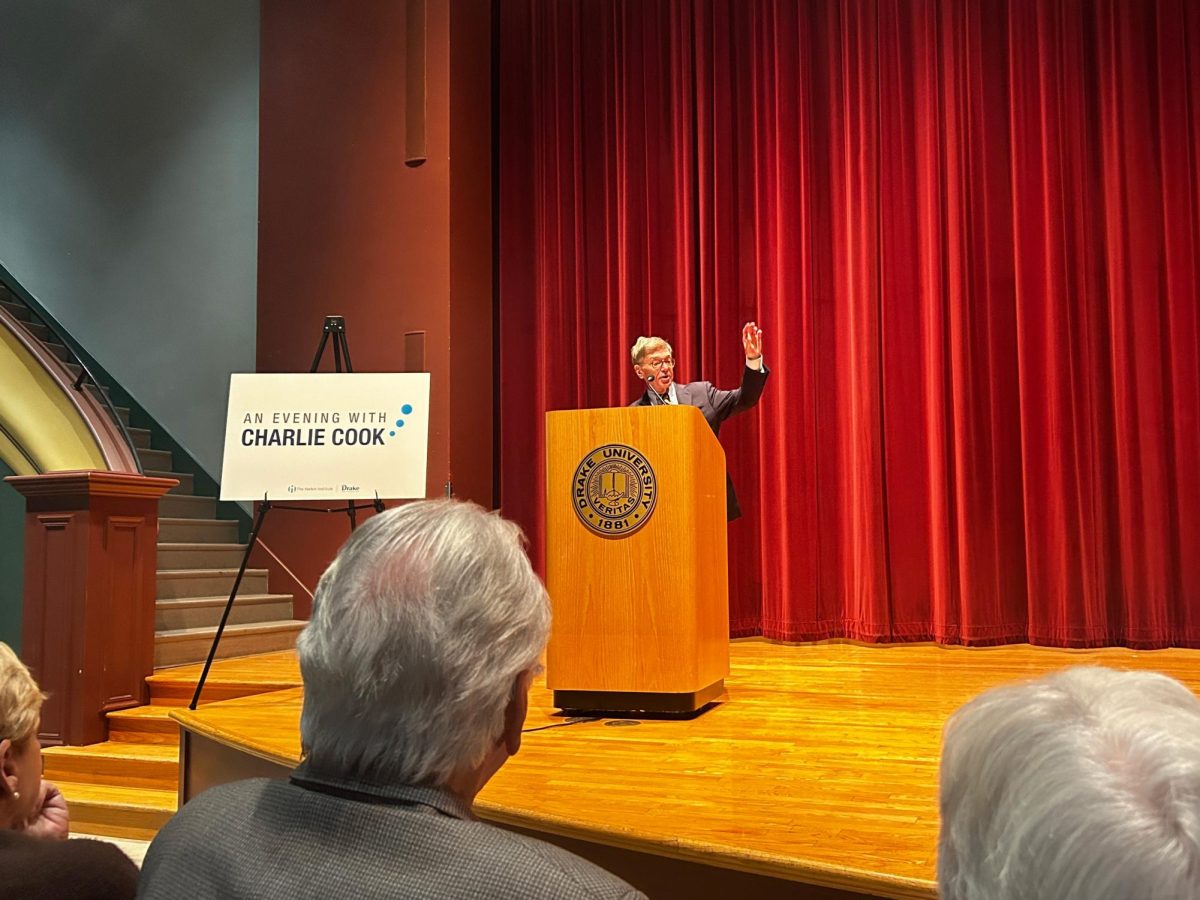Story by Bailey Berg
Photo by Luke Nankivell
 It is becoming the norm across the Drake University campus. Students are checking their phones and computers everywhere. Whether it’s while having breakfast in Hubbell Dining Hall, walking to and from class, working out on the elliptical in the gym or even during lectures, Drake students are having a hard time going without their electronic devices.
It is becoming the norm across the Drake University campus. Students are checking their phones and computers everywhere. Whether it’s while having breakfast in Hubbell Dining Hall, walking to and from class, working out on the elliptical in the gym or even during lectures, Drake students are having a hard time going without their electronic devices.
For junior biochemistry, cell and microbiology and history double major Mallory Bonstrom, the Internet has become not only her primary tool for conducting research and completing homework, but something she uses frequently to simply pass the time.
Bonstrom estimated that she spends between six and eight hours every day on her computer, plus additional time on her phone.
“I check Facebook maybe 20 to 25 times a day,” Bonstrom said. “It’s gotten worse since I got my iPhone.”
Senior anthropology, sociology and education double major Samantha Williams is in the same boat as Bonstrom.
“I feel like I’m on my computer or iPod more than ever before,” Williams said. “This semester is really hectic. I’d say I probably spend about six hours on the computer everyday. I use the computer at work too though, so on those days, it’s higher. Probably closer to 12 (hours).”
However, when asked if they could go without their electronic devices for a weekend, both Williams and Bonstrom said they believed they could.
A few weeks ago marked the second-annual National Day of Unplugging. The goal was to have as many people as possible pledge to go without electronic devices — whether it was a cell phone, computer, iPod or anything else they needs to be plugged in — from sunset to sunset.
The movement was started by members of the non-profit group, Roboot, a Jewish network with an aim to “reboot” Jewish traditions. In this case, the project was an outgrowth of an adaption of their ancestors’ ritual of carving out one day per week to “unwind, unplug, relax, reflect, get outdoors and connect with loved ones.”
According to the group’s website, they started the effort because, “We increasingly miss out on the important moments of our lives as we pass the hours with our noses buried in our iPhones and BlackBerrys, chronicling our every move through Facebook and Twitter and shielding ourselves from the outside world with the bubble of ‘silence’ that our earphones create.”
Though the pledge may be difficult, especially on a college campus where students require use of electronic devices to complete homework assignments and conduct research (as well as use various social media platforms), a March 2 Huffington Post article “Day Of Unplugging 2013: 6 Health Reasons You Should Spend Time Tech-Free” said spending more time “off the grid can be surprisingly beneficial to your mood, relationship and overall health.”
Assistant Wellness Director Johanna Determann said she has noticed students becoming more distracted by their electronic devices.
“I occasionally see students using their phones during yoga or pilates, which makes me a bit sad,” Determann said. “If you can’t be unplugged for 45 or 60 minutes, that’s a bit concerning, in my opinion. I know that this has just become the way we, as a society operate, but the world will go on without you checking your notifications.”
Determann said there are numerous ramifications of students being too plugged-in.
“People who sit too much can experience lower back pain, especially if they’re not practicing good posture or if they are not stretching regularly,” Determann said.
One of Drake’s licensed massage therapists Anne Boal said, “Poor posture leads to lots of back, spine and neck issues.”
Those issues can include difficulty swallowing, sleep apnea, suboccipital pain syndromes, teeth clenching, migraine headaches and loss of body balance.
Physical aliments due to use of electronic devices aren’t limited to a desk or a seat in a lecture hall, however. ABC News reported a new and fast-growing phenomenon called “texting thumb,” a form of thumb tendonitis. There are also an increasing number of hand and wrist injuries due to use of computers and cell phones.
Determann also said people who “stare at computers for most of the day are more likely to experience headaches, dry eyes, neck or back pain or even blurred or double vision.”
The Huffington Post article also said using something with a screen before bed can disrupt your sleep as well because screens emit a blue wavelength of light that tricks the brain into thinking it’s time to be alert, thereby delaying the natural release of the sleep-aiding hormone melatonin.
Even so, The National Sleep Foundation reported that 95 percent of United States citizens use some form of an electronic screen in the hour before bed — whether it is a television, video game or electronic reader.
The Huffington Post also said being too plugged-in also makes it harder to focus and be productive, increases stress levels, stunts creativity and makes your driving more dangerous.
However, Determann thinks one of the biggest problems of being too plugged-in is a loss of personal connections with other people.
“As technology has developed we’ve made more online connections than ever, but I worry that our interpersonal communication might not continue to grow and develop,” Determann said. “Because I believe that social wellness is integral to overall well-being, I think it’s still important to have face-to-face communication as much as possible. Sure, being connected via the web is also social well-being but at the end of the day, I think the most meaningful relationships and the most effective communication happens in person.”
Determann doesn’t like that always being plugged-in makes you available at any given time. To combat that, Determann refuses to check her work email form home and doesn’t have it connected to her phone.
“I think this gives me a really good work-life balance,” Determann said. “Don’t get me wrong, I love technology, but I also enjoy the simplicity of my time unplugged.”
Bonstrom understands Determann’s unplugged philosophy.
“I didn’t have my 3G on my phone when I was studying abroad, so I was without Internet quite a bit,” Bonstrom said. “It was really nice, actually.”
Williams said she shares Bonstrom’s sentiments.
“I don’t bring my electronics when I go on my backpacking trips and I love it,” Williams said. “It’s an escape from the craziness of the technologically advanced world we live in today. That’s one of the reasons I like traveling overseas so much. It’s more about personal connections than hiding behind a shield of technology.”






